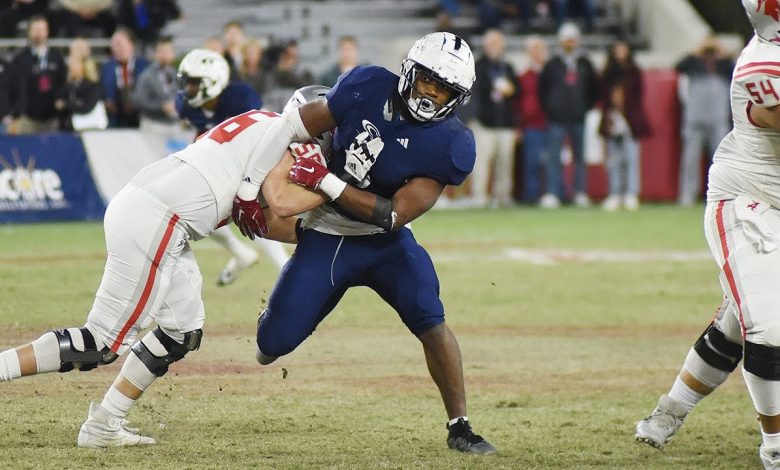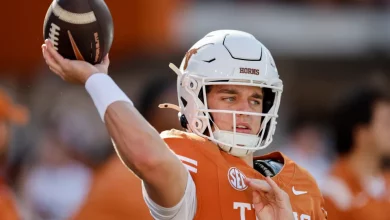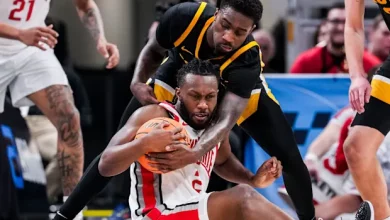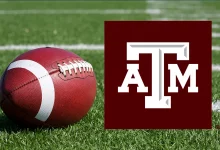DJ Barber is no longer with Auburn football after his arrest, involving marijuana, THC vapes, scales, packaging, nearly $1,900 cash, and a Glock 19 pistol found in his vehicle.

The world of college sports is often viewed through a lens of athletic achievement, school pride, and community engagement. However, it also faces ongoing challenges related to athlete conduct, legal issues, and institutional accountability. The recent arrest involving Auburn football player DJ Barber exemplifies these challenges and raises questions about athlete behavior, university policies, and the repercussions of legal infractions within the realm of college athletics.
The Incident Details
On a Monday that has since garnered significant attention, DJ Barber, a member of the Auburn football program, was taken into custody following a police investigation that uncovered a substantial amount of illegal substances and firearms. According to reports, law enforcement officials recovered approximately two and a half pounds of marijuana, THC vapes, digital scales, marijuana packaging materials, nearly $1,900 in cash, and a Glock 19 9mm pistol from the vehicle Barber was in.
These items, particularly the quantity of marijuana and the firearm, represent serious legal concerns. The possession of such a large amount of controlled substances suggests intent for distribution, not just personal use, and the presence of a firearm adds an additional layer of legal and safety considerations. The incident has led to significant consequences for Barber both legally and within the Auburn football program.
Immediate Response from Auburn University
Following the arrest, Auburn University swiftly responded by parting ways with DJ Barber, ending his association with the football team. This decision underscores the university’s stance on maintaining a standard of conduct among its student-athletes, emphasizing that legal issues, especially those involving illegal substances and firearms, are incompatible with university policies and the integrity of its athletic programs.
Auburn’s quick action aligns with NCAA guidelines and the institution’s code of conduct, which typically mandate disciplinary measures—including suspension, probation, or dismissal—when athletes are involved in criminal activity. The university’s response demonstrates a commitment to upholding its reputation and setting a precedent that legal troubles will have tangible consequences for student-athletes.
The Broader Context: Athletes and Legal Troubles
The arrest of DJ Barber is not an isolated incident in college sports. Historically, student-athletes have occasionally found themselves embroiled in legal issues, ranging from minor infractions to serious criminal charges. These incidents often spark debates about athlete conduct, institutional oversight, and the role of sports programs in fostering responsible behavior.
The visibility of college athletes—particularly those in prominent programs—means that their actions are scrutinized both nationally and within their communities. When incidents like Barber’s occur, they challenge the narrative of athletes as role models and raise questions about the effectiveness of university policies and support systems designed to promote athlete well-being and responsible conduct.
Legal Implications and the Nature of the Charges
The items recovered—marijuana, THC vapes, digital scales, packaging materials, cash, and a firearm—point toward potential charges related to drug possession with intent to distribute and firearm possession. These are serious allegations that can carry significant legal penalties, including fines, probation, or incarceration, depending on jurisdiction and the specifics of the case.
Moreover, possession of a firearm during the commission of certain drug-related offenses can lead to federal charges, especially if the firearm is linked to distribution activities. The legal process will determine Barber’s fate, but the initial evidence suggests that the charges could be substantial.
The Impact on Barber’s Future
DJ Barber’s departure from Auburn football is a clear consequence of the incident. Beyond the immediate termination of his athletic involvement, the legal charges and associated stigma could significantly impact his future prospects—both within sports and beyond.
In college sports, the NCAA maintains eligibility rules that often disqualify athletes involved in certain criminal activities. Even if Barber were to resolve his legal issues favorably, his reputation might suffer, influencing future opportunities in sports, coaching, or other careers.
From a personal perspective, legal troubles can have lasting effects on an individual’s life, including challenges in securing employment, housing, or other opportunities. The incident also raises questions about Barber’s decision-making and the circumstances that led to this situation.
Institutional and Community Responsibility
Universities and athletic programs bear a responsibility to educate, mentor, and support their athletes. Many institutions implement drug education programs, counseling services, and conduct policies aimed at preventing misconduct.
In Auburn’s case, this incident serves as a reminder of the importance of proactive measures to address issues related to substance abuse and legal trouble among student-athletes. While the university’s swift disciplinary action reflects a zero-tolerance stance, it also prompts reflection on whether additional support systems could mitigate such occurrences.
Communities surrounding college programs also play a role. Local law enforcement and community organizations can collaborate with universities to provide resources, education, and intervention strategies designed to prevent illegal activity among youth and student-athletes.
Broader Cultural and Social Implications
Incidents involving athletes and illegal substances often ignite broader cultural debates. Some argue that societal pressures, the high-stakes environment of college sports, and the allure of fame and money contribute to risky behavior. Others contend that athletes are unfairly scrutinized or held to different standards.
This incident also highlights ongoing issues related to drug use, mental health, and the responsibilities of institutions to foster positive environments. It emphasizes the need for comprehensive programs addressing mental health, substance abuse prevention, and personal development.
The Role of Media and Public Perception
Media coverage of DJ Barber’s arrest amplifies public awareness and influences perception. While transparency is essential, sensationalized reporting can sometimes distort facts or unfairly stigmatize individuals.
Public perception of athletes involved in legal trouble often varies, influenced by community values, media narratives, and individual biases. It’s crucial for institutions to communicate transparently while respecting due process, ensuring that responses are proportional and just.
Moving Forward: Lessons and Preventative Measures
This incident offers several lessons for all stakeholders:
- For Universities: Implement comprehensive education and support programs emphasizing responsible conduct, substance abuse prevention, and legal awareness. Establish clear consequences for misconduct, aligned with NCAA and institutional policies.
- For Athletes: Recognize the importance of making responsible choices, understanding the legal and personal risks associated with illegal activities, and seeking help when needed.
- For Law Enforcement and Community Leaders: Collaborate with educational institutions to create outreach programs that prevent illegal activity and support at-risk youth and athletes.
- For Fans and the Public: Understand the complexities behind athlete conduct issues and advocate for fair treatment, accountability, and preventive measures.
Conclusion
DJ Barber’s arrest and subsequent departure from Auburn football mark a significant moment in the intersection of college athletics, legal accountability, and institutional responsibility. While the incident is a setback for Barber and the Auburn program, it also serves as a broader reminder of the importance of proactive support, education, and accountability in shaping responsible athletes and community members.
As the legal process unfolds, the focus should remain on ensuring justice, offering support for rehabilitation if needed, and reinforcing the values of integrity and responsibility within college sports. Moving forward, institutions like Auburn must continue to foster environments that promote not only athletic excellence but also personal growth, ethical conduct, and community well-being.









